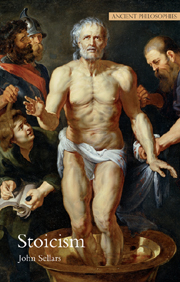3 - Stoic logic
Summary
Logic in antiquity
Following the Stoic division of philosophical discourse into logic, physics and ethics, we shall begin by looking at Stoic logic. By the term “logic” today we usually mean the formal analysis of arguments. While this sort of abstract reasoning was an important part of logic in antiquity, ancient logic was much broader than its modern counterpart. “Logic” translates logikē, and logikē is that part of philosophy that examines logos – reason, language or argument – in all of its forms, including formal arguments, rhetorical arguments, speech, grammar, philosophy of language and truth (i.e. epistemology). The formal abstract reasoning that now constitutes logic was known in antiquity as one part of dialectic, and dialectic was just one part of logikē.
For the Stoics, logic comprised dialectic and rhetoric as two principal divisions. Other Stoics added definition and canonic (epistemology) as further parts, and some added canonic but not definition (see DL 7.41–3). In what follows I shall look first at Stoic dialectic, then what we might call their philosophy of language and finally their epistemology. But I shall leave to one side their discussions of rhetoric and their important work on grammar.
Stoic dialectic
Stoic logic did not fare well in subsequent history. It is fair to say that its significance was not really comprehended until fairly recently by the Polish logician Łukasiewicz in the early twentieth century (Bocheński 1951: 80).
- Type
- Chapter
- Information
- Stoicism , pp. 55 - 80Publisher: Acumen PublishingPrint publication year: 2006

